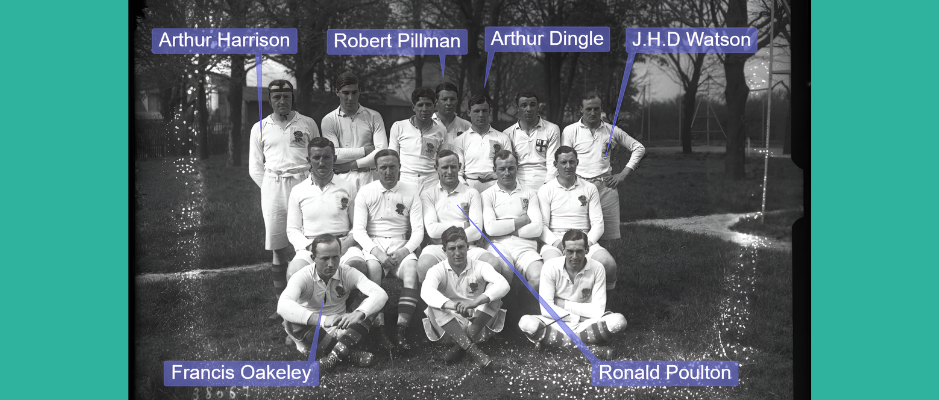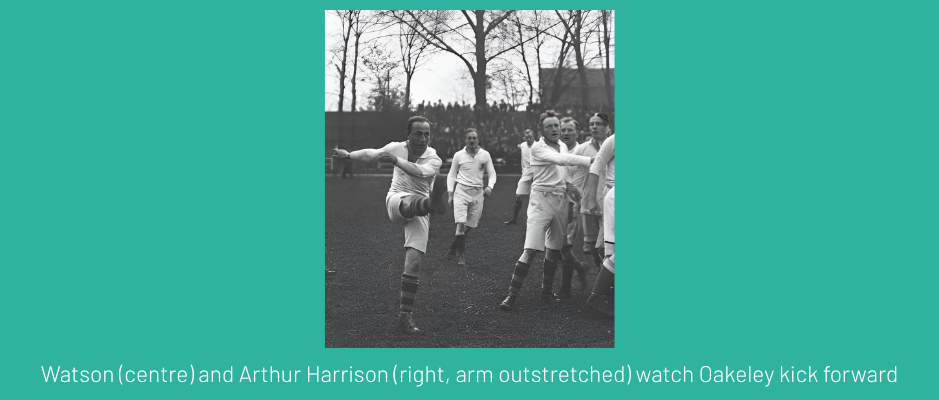Views
The last Five Nations before The Great War - Part Three

The banner image above shows the England team that played France on April 13th 1914, the last Five Nations match before the Great War in which six of its members would die.
In Part Three of our series for the Remembrance period, Peter Bloor now looks at one of them, James Henry Digby (J.H.D.) Watson, and at his controversial selection for England after playing almost all of his club rugby in Scotland and having represented that country in the long jump against Ireland in 1912.
“Curious Rugby selections”
There may be a clue in his name but Hamish Stuart of the Daily Chronicle did not approve of J.H.D. Watson’s selection for the South against England in the first of the trial matches before the 1914 Five Nations. “I have” he wrote, “always opposed the principle of selecting men willing to play…for either of two countries…Watson was first reserve for Scotland against England in 1911 and…that should have fixed his nationality even if it had fixed it wrongly.”
“An international qualification of a somewhat elastic nature”
“Wrongly” - in Stuart’s view - because Watson had declared himself an Englishman, as he indeed was, having been born in Southsea to an English father and a Canadian mother. However, Stuart’s counterpart at the Daily Record, “Gaberlunzie”, had previously been more pragmatic, saying that despite Watson having played in Scotland for six years, making him “a better qualified ‘Rugby Scot’ than many a one that has been approved by the S.R.U. committee of selection”, Scotland were clearly not going to pick him, leaving him no choice but to try for an England cap.

“Scotland do not know a player when they see one”
J.H.D.’s time in Scotland was spent at Edinburgh Academy and Edinburgh University between 1906 and 1913, when he graduated as a Bachelor of Medicine and of Surgery. He played his rugby for Edinburgh Academicals between 1908 and 1913, giving the Scottish selectors plenty of time to recognise what he might bring to their side. He was versatile, switching to full back from three-quarter when injured against Royal High School F.P. in 1912 for example, quick to take advantage of the slightest opening, as he did when using his size, strength and speed to score both Academicals’ tries in a 10-6 defeat to Edinburgh University also in 1912, and a capable place-kicker who scored five goals when the Academicals won 31-25 at Manchester that same year.
He also simply scored tries - four at Manchester - and six against Kelvinside Academicals in January 1911, five weeks after he had demonstrated in Edinburgh’s 26-5 win in the inter-city match against Glasgow that he was “no mere touchline sprinter” but a player with “a vast stock of all-round football, a good head and abundance of confidence” – yet the Scottish selectors showed little or no interest in him.
“For goodness sake, have Watson picked for England”
The English did though, and in February 1913 two representatives of the R.F.U. arrived at Raeburn Place to watch J.H.D. play for Edinburgh Academicals against Glasgow Academicals. Edinburgh won 14-3 and he dominated the match, scoring a try, two conversions and a drop goal, but the R.F.U. men still had reservations after witnessing his overly-individual approach, the result, some thought, of him being so far the best of his side’s three-quarters that he tried to do too much himself.
For the moment they did not pursue their interest, but did so later in the year after J.H.D. had moved to London to finish his medical studies and to play for Blackheath. He was selected against England in two trial matches, for the South in December 1913 – this was the selection Hamish Stuart so disapproved of – when he was again clearly the best of a weak three-quarter line, and for the Rest in January 1914, when he played very well indeed, with his ability to play at wing, centre or half-back adding to the favourable impression he made.

“Watson, a Scotsman, is a newcomer…”
J.H.D. was duly selected for the upcoming Five Nations but like everyone except the brilliant Ronald Poulton could do little in attack against Wales and their dominant forwards, although he did play a part in the try scored by Cherry Pillman. He missed the match against Ireland with an injury but returned for the next at Inverleith where, against the country that had not wanted him, he gave a display of handling, precisely timed passing and elusive running that was at least the equal of that given by “without question one of the greatest artists playing the game” – Poulton himself.
England beat Scotland by one point, 16-15, and J.H.D. created all four of their tries, the first when he “out-Poultoned Poulton in the way he swerved and made the way clear for his wing” and the second when “It seemed to be Poulton who was dancing through the Scotland side, and one only recognised Watson when Poulton, backing up, took the pass and dashed over the line.”
“Loss of the Hawke”
Brilliantly as he had played J.H.D. had not scored against Scotland, but he did so in the next match against France, the last Five Nations match before the Great War in which he was serving aboard H.M.S. Hawke when she was torpedoed in the North Sea. “There was”, a survivor recounted, “a terrible explosion…the way the vessel heeled over made it almost impossible to get the boats out. The boat in which I was saved had a narrow escape of being taken down with the suction.” Temporary Surgeon J.H.D. Watson was not one of the few who also escaped, and he is now remembered on the Chatham Naval Memorial and on the Scottish National War Memorial.
Remembering the 524 men killed aboard H.M.S. Hawke and the 70 who survived the explosion and her sinking on October 15th 1914.
References
The quotes and other information in this article are taken from the Daily Chronicle, the Daily Record, the Athletic News, the Scottish Referee and other Scottish newspapers, The Times and Manchester Guardian 1910-1914
Images: All Agence Rol, Source gallica.bnf.fr/Bibliothèque nationale de France
Comments: 0 (Add)
In this section
Volunteers
We’re always on the lookout for volunteers to help run our clubs all across England, Scotland and Wales – find out more here.
Find a club
Want to know where your nearest Sporting Memories club is? View our Club Finder page here.